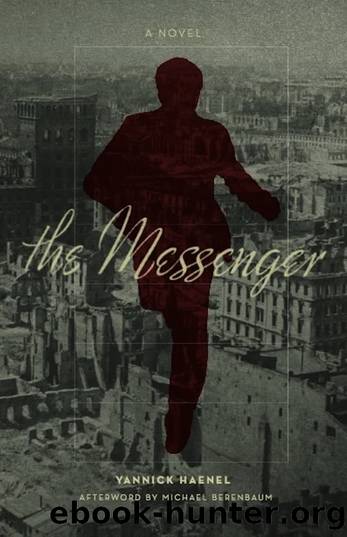The Messenger by Yannick Haenel

Author:Yannick Haenel
Language: eng
Format: epub
ISBN: 9781619020481
Publisher: Catapult
Published: 2018-05-16T00:00:00+00:00
It was now November 28 1942. Jan Karski had succeeded in reaching the Polish government in exile. There now began a long period of reporting. Each day was made up of talks, interviews, meetings and conferences. The sensation of freedom that he had felt on arriving in England disappeared as he started talking about the internal events in Poland: he was then plunged back into what he calls âthe Gestapo-haunted, suffering atmosphere of the Undergroundâ.
It was firstly Stanislas Mikolajczyk, the Minister of the Interior, who received his oral report.
Then he met General Sikorski, the head of the government. They knew each other, because they had met in Angers, during Karskiâs first mission to France. They spoke for a long time about the future organisation of Poland, and the plans that the leaders of the Underground were devising for when the war was over.
Sikorski decorated Karski with the cross of Virtuti Militari, the highest Polish military distinction. Then he personally presented him with a silver cigarette case with his signature engraved on it, and told him to get some rest: âDonât let all these conferences and reports wear you out. Donât let the Allies do what the Gestapo failed to accomplish.â
He looked at the scars on Karskiâs wrists: âThey look nasty,â he said. âFrom what I can see the Gestapo gave you a decoration too.â
Karski then informed the leaders of the Allies, firstly Anthony Eden, the British Minister of Foreign Affairs. He had been Karskiâs idol in his youth; when studying political science in the library of the League of Nations in Geneva, Karski had admired his eloquence and elegance.
Anthony Eden listened to him attentively, then said: âYou seem to have been through everything in this war, except one: the Germans did not shoot you.â
Karski met with all of the British political leaders, then presented himself before the United Nations War Crimes Commission. He explained what he had seen in the Warsaw ghetto and at the camp of Izbica Lubelska (which he still called Belzek in his book). âMy testimony,â he said, âwas placed on record and I was told that it will be used as evidence in the United Nationsâ indictment against Germany.â
He was interviewed by the British press and by that of the other Allied countries; he met with politicians, writers and representatives of various churches.
He soon realised that, in London, Poland did not count for much. The interests at stake were so complex, and the war machine and its economy so weighty, that the Polish situation was a secondary consideration. In fact, who were the Poles? For the British, Poland could be summed up by the short campaign of September 1939, and âsome echoes of obstinate resistanceâ, as Karski put it. When it came down to it, no one understood the heroism of that nation which refused to collaborate with Germany; no one understood that notion of an âUnderground stateâ, while everywhere else compromise prevailed. And then, as Karski puts it, people constantly wondered if the sacrifices of
Download
This site does not store any files on its server. We only index and link to content provided by other sites. Please contact the content providers to delete copyright contents if any and email us, we'll remove relevant links or contents immediately.
Harry Potter and the Goblet Of Fire by J.K. Rowling(3046)
Unfinished: A Memoir by Priyanka Chopra Jonas(2918)
Never by Ken Follett(2883)
The Man Who Died Twice by Richard Osman(2300)
Machine Learning at Scale with H2O by Gregory Keys | David Whiting(2293)
Fairy Tale by Stephen King(2071)
Will by Will Smith(2043)
Rationality by Steven Pinker(1765)
The Storyteller by Dave Grohl(1662)
The Dawn of Everything: A New History of Humanity by David Graeber & David Wengrow(1571)
The Dark Hours by Michael Connelly(1571)
The Stranger in the Lifeboat by Mitch Albom(1532)
Cloud Cuckoo Land by Anthony Doerr(1435)
The Becoming by Nora Roberts(1331)
Friends, Lovers, and the Big Terrible Thing by Matthew Perry(1330)
New Morning Mercies: A Daily Gospel Devotional by Paul David Tripp(1325)
Crying in H Mart by Michelle Zauner(1316)
Einstein: His Life and Universe by Walter Isaacson(1315)
A Short History of War by Jeremy Black(1300)
